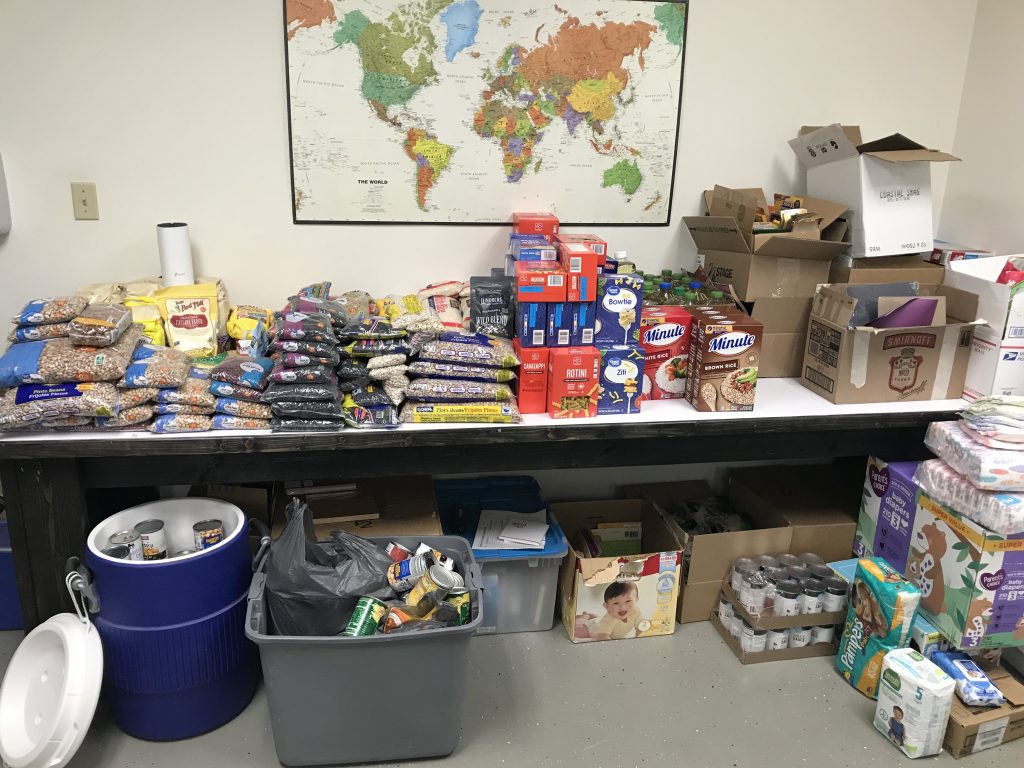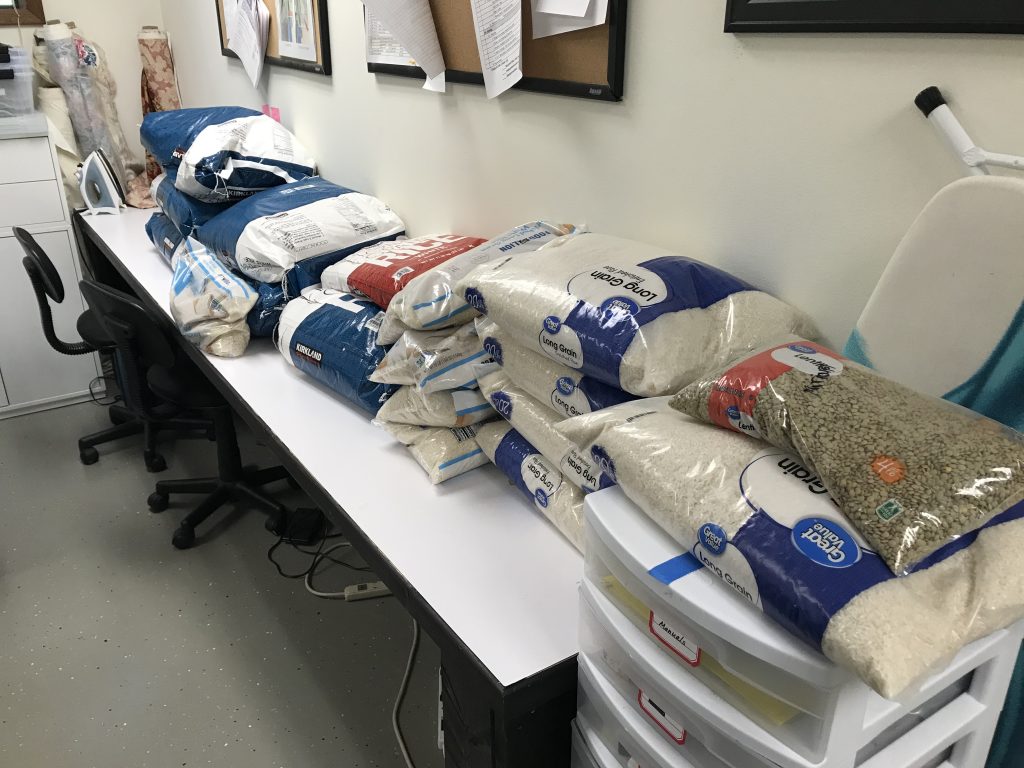Uncategorized
Welcome to Reciprocal Hospitality
Many American Christians have good intentions, working hard to welcome immigrants with hospitality and solidarity. But how can we do that in a way that puts our immigrant neighbors first rather than pushing them to the fringes of white dominant culture and keeping them as outsiders? That’s exactly the question Karen González explores in Beyond Welcome: Centering Immigrants in Our Christian Response to Immigration, a new book coming out this fall.
Today, we’re excited to share an excerpt adapted from Beyond Welcome and hope you feel challenged to move beyond welcome as you get to know new immigrants in your community.
In many Latin American countries, hospitality is expressed in the familiar proverb “Mi casa es su casa.” It is notable that the saying includes the pronoun “su,” which stands for the formal “usted” used when talking to strangers or older people.
The phrase means “My home is your home, stranger.” How does that phrase reimagine the way we think about hospitality to strangers and immigrants? How does it move us beyond the host and guest dichotomy and into a hospitality that moves in both directions, a reciprocal hospitality?
I remember being awed when I learned that in his lifetime Jesus received and accepted hospitality and financial support from many people found on the margins of the first-century Near East: women, sex workers, tax collectors who were known for cheating people, and other sinners.
What is perhaps less known is that he also reciprocated this hospitality—though he was a man without a home as he himself says, “Foxes have holes, and birds of the air have nests; but the Son of Man has nowhere to lay his head” (Luke 9:58), he not only shared meals with people but also saw them, listened to them, accepted them and identified fully with them. He embraced them with a hospitable generosity of heart — listening, learning and engaging over and over again in his encounters with those in and outside his immediate circle:
- the Samaritan woman at the well in John 4
- his disciples on the road to Emmaus in Luke 24
- in conversation with the Syrophoenician woman in Mark 7
This reciprocity is exactly what is often missing in modern rhetoric around hospitality to refugees and other immigrants—that hospitality only moves in one direction: from the native citizen with rights to the immigrant in need. I am not referring to the kind of hospitality where an immigrant person is invited to a citizen’s home for dinner, though that is one kind of hospitality.
What I am referring to is the kind of hospitality that is truly engaged, where native citizens listen to and learn at the feet of immigrants they have welcomed to their countries—the kind where immigrants are asked to give feedback and evaluate services we receive, including resettlement; the kind where immigrants are at the table and asked to speak into the planning of programs and services that serve our own communities; the kind where our dignity and choices are respected and decisions are not made on our behalf.
When hospitality is not reciprocal, those belonging to the dominant culture unconsciously begin to think of immigrants as having less in every way. The truth is that immigrants may need material possessions, language classes and other services, but as image bearers of God, we have gifts, talents and skills, not just needs.
It is important to revive the biblical practice of reciprocal hospitality in order to counteract these toxic narratives.
In her book Making Room: Recovering Hospitality as a Christian Tradition, Professor Christine D. Pohl writes, “There is a kind of hospitality that keeps people needy strangers, while fostering an illusion of relationship and connection. It both disempowers and domesticates guests while it reinforces the hosts’ power, control and sense of generosity. It is profoundly destructive to the people it welcomes.”
Without reciprocal hospitality, we unwittingly reinforce the status quo and unequal power dynamics—this action mars the image of God in our immigrant neighbors and widens the distance between us. Hosts have something to offer to immigrants, but immigrants have nothing to offer to hosts. When hospitality is reciprocal, it encourages the hosts’ humility and diminishes the impact of the disparate power dynamics in the room.
In John 14, as Jesus prepares for his death and for leaving his disciples, he says to them, “Do not let your hearts be troubled. Believe in God, believe also in me. In my Father’s house there are many dwelling places. If it were not so, would I have told you that I go to prepare a place for you? And if I go and prepare a place for you, I will come again and will take you to myself, so that where I am, there you may be also.”
The one who has been received, fed, and cared for in many homes will now return to his home to prepare a place for them in his own Father’s house—a reciprocal hospitality. They wouldn’t be just guests in the house but family, welcomed in “Mi casa es su casa” style!
You can pre-order Beyond Welcome: Centering Immigrants in Our Christian Response to Immigration here!

Karen Gonzalez serves as the Director of Human Services at World Relief. Shes is is the author of The God Who Sees: Immigrants, the Bible and the Journey to Belong, and Beyond Welcome: Centering Immigrants in Our Christian Response to Immigration.
Family Amidst Tragedy
How one Good Neighbor Team is providing hospitality and hope.
It’s been eight months since the fall of Kabul. World Relief North Texas welcomed many Afghans with the help of volunteer Good Neighbor Teams. Read about their mutual transformation as they recount their shared stories with us.
Susan has been attending Arlington Chinese Church for 6 years now. She is a part of a young professional’s community group there, where she has been able to develop an amazing community and grow in her relationship with Christ. Her parents were immigrants to the U.S. when she was just 3 years old. After moving from China to Texas, Susan worked hard alongside her parents to integrate to life in the U.S. During Susan’s 4 years of medical school in Fort Worth, she lived in nearby apartments where many refugees had been resettled by World Relief.
Her next introduction to the needs of new families was through her clinic, where many of them came in for their very first appointment with a doctor in the U.S. Through a desire to serve the most vulnerable and to understand her patients better, she explored volunteer opportunities with World Relief. She encouraged members of her small group to get involved by volunteering for a one-day event at a soccer game.
From this one event, her small group realized a need and wanted to know how to become more involved. As they prayed, they decided to serve as a Good Neighbor Team, a group of 8-12 people who commit to serve and walk with an arriving refugee family for the first 6 months in the U.S. As they prepared to become a Good Neighbor Team, the Afghan crisis happened and Kabul fell to the Taliban. Susan recalled that “the Lord timed it really well and we were able to take an Afghan family right as they came to the US.”
Asadullah and Sahar
Asadullah and Sahar lived a normal life in Afghanistan. Asadullah worked for the U.S. Government as a translator, and Sahar taught at an elementary school until she had two kids of her own who are now 2 and 4 years old, with a third child on the way. Asadullah mentioned that in the midst of this normal life, there were still hints of violence and danger throughout Afghanistan. Things such as target killings of those who were helping the U.S. or international organizations. Tragically, this included the assassination of Sahar’s father.
The Taliban’s invasion of their home displaced Asadullah and Sahar, along with over 700,000 other Afghan peoples who were evacuated from Kabul. Asadullah remembers receiving an email from his company that the Taliban had invaded and he needed to leave immediately. He rushed to get his wife and two children where they walked and waited in the Kabul airport all night long.
From here, they went on a long journey to arrive at a camp in El Paso, where they remained for two months. Then they were sent to Fort Worth, Texas where they were resettled by World Relief.
North Texas
When they arrived in Fort Worth, Asadullah says that they were excited because “we had a home and a kitchen, and World Relief continually helped us.” Susan recalled that they first met them in their AirBnB because their apartment was not ready yet. One of the first things that was said by Asadullah was “we are so happy to meet people that look like us.” (They are ethnically Hazara which descends from Mongolians and they will look more East Asian and less Arab or Persian.) Asadullah and Sahar shared with their Good Neighbor Team, “it is not just a coincidence that we were paired with you.” Susan shares that they are so sweet, the family was eager to get involved, settle down, and get their kids enrolled in school. It was a thrilling experience for the Good Neighbor Team to help them enroll their children in school and help them become integrated into society.
What impacted Asadullah and Sahar most upon their arrival in Fort Worth, was their Good Neighbor Team. Their Good Neighbor Team were the first people to meet them, help them move into their apartment, and take them grocery shopping. Asadullah and Sahar did not have any form of transportation or any knowledge of the metroplex, and are thankful that they had a Good Neighbor Team to show them these things. Their new friends took them grocery shopping, bought clothes for their children, and took them to picnics at the park.
After several months of spending time with his Good Neighbor Team, Asadullah reflected: “One time I invited the Good Neighbor Team over. We were all sitting around the kitchen table and I thought, ‘this is my family.’”
The impact surpassed any barrier of culture. Asadullah mentioned, “any time I faced a problem or didn’t know what to do, they were who I called. Without them, I’m sure I would have faced many problems.”
Family Amidst Tragedy
Sahar tragically had a miscarriage shortly after arriving to North Texas. Sahar mentioned how scary it was losing a child in a new place with no family. When she miscarried, they immediately turned to their Good Neighbor Team for help to navigate such a tragic situation. Susan was able to get Sahar to the hospital, and helped them navigate surgery, recovery, and medical bills. She still experiences deep sorrow over this loss, but the Lord used this circumstance to show Asadullah and Sahar that they are never alone, even during the most tragic times.
“Our Good Neighbor Team behaved like a family and encouraged us to not be disappointed about uprooting our lives.”
The Impact
As a huge impact was being made on the lives of Asadullah and Sahar, another impact was being made in the hearts of their Good Neighbor Team.
Susan mentions being impacted by the hospitality that Asadullah and Sahar showed them. She recalls being at their apartment with the whole team when they hardly had any furniture, and Sahar served them all tea and food, and gave whatever she did have to host them. Susan was deeply marked by being served by someone who hardly had anything.
We asked Susan what made the biggest impact on her in getting to serve Asadullah and Sahar, and she shared with us through tears, “seeing them has helped me to understand my parents’ journey to the U.S. as immigrants with nothing but a few hundred dollars.” Watching Asadullah and Sahar learning how to adjust their entire lives, and wanting to provide in the best way for their children has helped her understand what her own parents went through. “I never understood the sacrifices my parents had to make for certain things until I saw Asadullah and Sahar’s journey.”
Another amazing part of Susan’s parents’ story she shared was “my parents had an older couple who welcomed them from the airport and cared for them for the first 1-2 years of them being in the U.S. They helped my parents adjust and adapt because my parents spoke no English at first.” Susan, as well as the rest of the Good Neighbor Team, was able to love this family even more because they found unique ways they related to Asadullah and Sahar. “It’s been very rewarding to see how God uses each person on our Team because we all have different backgrounds and skill sets. God has allowed each of us to come alongside the family in different ways which is so sweet to see that this is how the body of Christ is.” Ultimately, she shared, “the impact on me has been the kindness shown in hospitality, the ability to relate from my own journey, and to see how the body of Christ can function using their different gifts.”
“They are very open about what they believe in, but also are very open to hearing about our faith, and I don’t believe any of those conversations could happen if it was not for the amount of time spent building a relationship.”
A New Home
Asadullah and Sahar say that they are happy they are here and that they are safe. They are thrilled that their daughters will have a great education and have an opportunity for a good life. Sahar said that she will never forget the first time she saw her good neighbor team because “I was so happy” she said as she beamed with joy even telling me about it. “It was very special. We felt like a family because our faces are the same as their faces. They are my family.” Right now, they are excited to attend Susan’s wedding. It will be their first American Wedding.
“The goal from the beginning was for them to see Jesus by becoming their friend.”
They have now been in the U.S. for 8 months, and in those 8 months, the Lord has provided them and their Good Neighbor Team with family, community, and the love of Christ.
If you have been inspired to serve with World Relief as part of a Good Neighbor Team, there are next steps for you!
Learn how you can become part of a Good Neighbor Team with World Relief Memphis HERE.
Your Family is Coming: The Long Road to Reunion for Refugees
Everyday, people like Ibrahim make the painful decision to leave their homes due to persecution, conflict, violence, human rights violations and climate-related factors. Their journeys are often marked by loss, separation and worry for those left behind.
For ten years, Ibrahim carried the weight of being separated from his family. This is his story of enduring hope.
An Impossible Decision
Ibrahim was born and raised in the Darfur region of western Sudan. He worked various jobs — housekeeping, construction, office administration — to provide for his family. He was married with three children and a fourth on the way.
While Ibrahim loved his home and community, the civil conflict left him feeling uneasy and concerned for his family’s safety.
For decades, Darfur has been embroiled in a conflict fueled by ethnic disputes and limited resources. In 2003, a rebel group launched an insurrection in Darfur, protesting what they believed was the Sudanese government’s disregard for non-Arab ethnic groups in the region. In response, the government armed ethnically Arab militias to combat rebels in Darfur.
Despite international attempts at peacebuilding and intervention, the conflict worsened. Militias threatened the lives and livelihoods of non-Arab civilians, burned down thousands of villages, committed sexual violence and blocked aid organizations from delivering much-needed food and medical supplies.
In 2013, as a renewed wave of violence gripped the region, Ibrahim made the heart-wrenching decision to flee Sudan, leaving behind his wife and children, hoping to find help.
“There was too much killing, too much fighting,” he said. “It was impossible to live.”
Seeking Safety
Ibrahim arrived in Jordan, where he had heard help was available. He registered with the U.N. High Commissioner for Refugees (UNHCR), meticulously completing his paperwork.
“I always wrote my kids’ names as my family on all the papers — all the dates of birth and everything,” Ibrahim said. He wanted to make sure records of his wife and children, still in Sudan, were included in his case so that they too would be resettled in a new country with him.
Ibrahim found work, sent money home to his family and waited.
Two years went by until one day, Ibrahim learned that his case had been approved for resettlement in the U.S. He passed all required security and health screenings, but because his family was still in Sudan, they could not travel with him.
With help from the International Organization for Migration (IOM), Ibrahim flew to the U.S. in 2016, where World Relief Triad welcomed him to North Carolina.
Ibrahim remembers feeling like he had escaped death.
“When I arrived, I was so grateful for World Relief because they helped me with everything,” Ibrahim said. “They helped me with a place to stay. They were able to find work for me, and they helped until I felt that I could do things for myself.”
And yet, as Ibrahim rebuilt his life in the U.S., he never stopped thinking of his wife and children, still stuck in Sudan. They frequently spoke over the phone — and Ibrahim continued to hope.
“I couldn’t really rest or enjoy all the blessings I had because I kept on thinking about them all the time,” Ibrahim said. “I never felt complete.”
Hoping and Waiting
Now in the U.S., Ibrahim continued working with IOM in the hopes of bringing his family to North Carolina. He was persistent, calling for updates whenever he could.
With IOM’s help, he was eventually able to secure interviews for his wife at the U.S. embassy in Khartoum, the capital of Sudan. Still, the process crept forward slowly.
Then, in 2019, just when everything finally looked ready to move forward, Ibrahim encountered another obstacle — the president of the United States announced a new executive order banning Sudanese people from traveling to the U.S., Ibrahim’s family included.
Ibrahim remembers being told, “Everything is correct; all the papers are the way they’re supposed to be. There are just some rules that they’re not allowing people.”
He began to doubt whether he would ever see his wife and children again. “I almost lost hope,” he said.
But then, in 2021, he got a call. A new U.S. presidential administration had reversed the executive order. Over the phone, he heard the long-hoped-for words: “Your family is coming.”
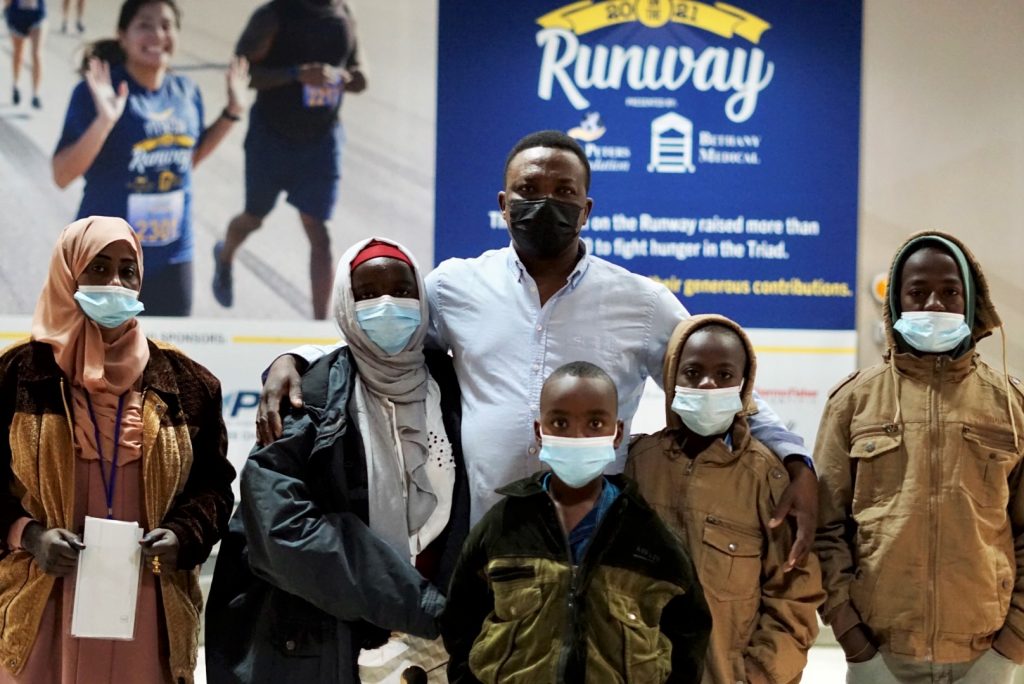
Ten years after Ibrahim had to leave his family behind in search of safety, after years of hoping and waiting, they would be reunited at last.
Reunited
In February 2022, Ibrahim gathered with staff from World Relief Triad at the airport to welcome his wife and four children to North Carolina.
“I broke down in tears because I hadn’t seen them in 10 years, and now they’re here, and it’s real,” Ibrahim said.
“The little one that I left was only three months; when he came, he was 10 years old. I cannot describe how I felt because I never thought — I was at the point of thinking maybe I will never see them again.”
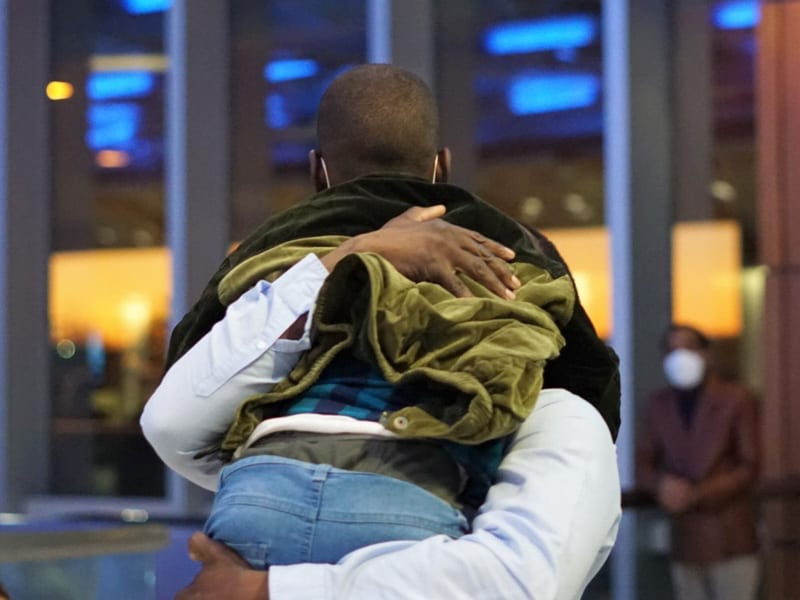
Now, with his family finally together again, Ibrahim has new hopes.
“My hopes are for my kids,” he said. “For them to get the right education, for them to be good people. I want them to make something for themselves and make me proud… for them to benefit themselves and our new country — the United States.”
Remembering Those Left Behind
Even as Ibrahim and his family continue building their new life together in the U.S., Darfur and the family, friends, and neighbors they had to leave behind are never far from his mind.
“People are really suffering there. They don’t have food, they don’t have water, they live in very unsafe, unhealthy conditions,” he said.
The UN estimates that 2.5 million people are living in displacement camps across Darfur, and 6.2 million people will need humanitarian assistance in the region within the next year. The same factors — war, violence, and persecution — that drove Ibrahim and his family from their home still impact people in Sudan today.
At World Relief, we recognize that addressing the drivers of mass displacement requires a multi-faceted and holistic response. In Sudan, World Relief is on the ground providing humanitarian assistance and investing in development and peacebuilding efforts to address the underlying factors contributing to conflict and displacement.
Building a just world means coming alongside families like Ibrahim’s once they’ve reached the U.S. and it means finding lasting solutions to the problems that force families to flee in the first place.
For Ibrahim, his hope for safety and brighter futures for those still in Darfur endures — “I really would like for them to… have a better life for themselves and for their kids.”
Together, we are taking action, hoping and praying for lasting solutions for displaced and separated families like Ibrahim’s both in the U.S. and in countries around the world.
World Relief Memphis, along with many other World Relief offices across the U.S., rely on partners and volunteers like you to help build welcoming communities. Join us on the path to hope, transformation, and lasting change alongside refugees and immigrants like Ibrahim.

Kelly Hill serves as a Content Writer at World Relief. She previously served as Volunteer Services Manager at World Relief Triad in North Carolina before moving to Salt Lake City. With a background in International and Intercultural Communication, she is passionate about the power of story to connect people of diverse experiences.
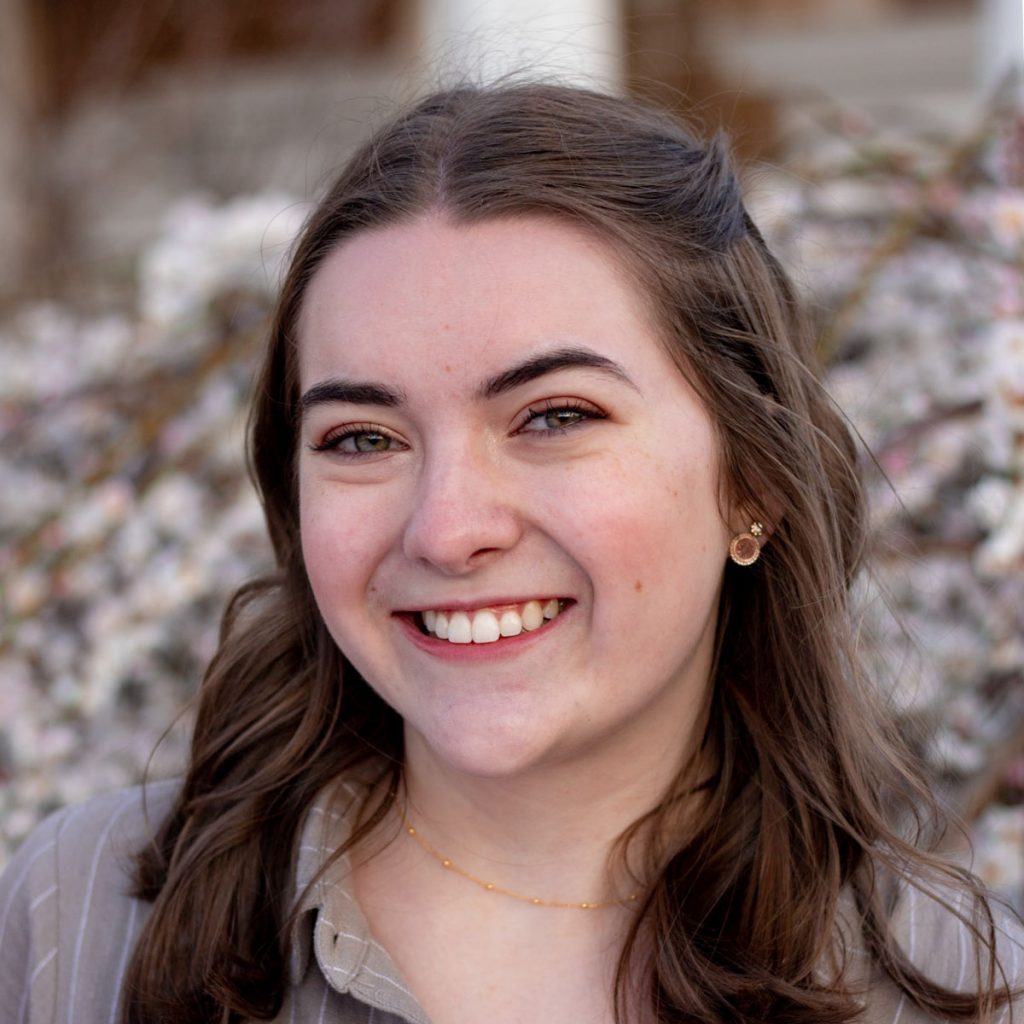
Abby Ray has been serving as the Communications & Advocacy Coordinator at World Relief’s Triad office since September 2021. She works to amplify the voices of clients, staff, and community members by empowering them to share their own stories.
Your Family is Coming: The Long Road to Reunion for Refugees
Everyday, people like Ibrahim make the painful decision to leave their homes due to persecution, conflict, violence, human rights violations and climate-related factors. Their journeys are often marked by loss, separation and worry for those left behind.
For ten years, Ibrahim carried the weight of being separated from his family. This is his story of enduring hope.
An Impossible Decision
Ibrahim was born and raised in the Darfur region of western Sudan. He worked various jobs — housekeeping, construction, office administration — to provide for his family. He was married with three children and a fourth on the way.
While Ibrahim loved his home and community, the civil conflict left him feeling uneasy and concerned for his family’s safety.
For decades, Darfur has been embroiled in a conflict fueled by ethnic disputes and limited resources. In 2003, a rebel group launched an insurrection in Darfur, protesting what they believed was the Sudanese government’s disregard for non-Arab ethnic groups in the region. In response, the government armed ethnically Arab militias to combat rebels in Darfur.
Despite international attempts at peacebuilding and intervention, the conflict worsened. Militias threatened the lives and livelihoods of non-Arab civilians, burned down thousands of villages, committed sexual violence and blocked aid organizations from delivering much-needed food and medical supplies.
In 2013, as a renewed wave of violence gripped the region, Ibrahim made the heart-wrenching decision to flee Sudan, leaving behind his wife and children, hoping to find help.
“There was too much killing, too much fighting,” he said. “It was impossible to live.”
Seeking Safety
Ibrahim arrived in Jordan, where he had heard help was available. He registered with the U.N. High Commissioner for Refugees (UNHCR), meticulously completing his paperwork.
“I always wrote my kids’ names as my family on all the papers — all the dates of birth and everything,” Ibrahim said. He wanted to make sure records of his wife and children, still in Sudan, were included in his case so that they too would be resettled in a new country with him.
Ibrahim found work, sent money home to his family and waited.
Two years went by until one day, Ibrahim learned that his case had been approved for resettlement in the U.S. He passed all required security and health screenings, but because his family was still in Sudan, they could not travel with him.
With help from the International Organization for Migration (IOM), Ibrahim flew to the U.S. in 2016, where World Relief Triad welcomed him to North Carolina.
Ibrahim remembers feeling like he had escaped death.
“When I arrived, I was so grateful for World Relief because they helped me with everything,” Ibrahim said. “They helped me with a place to stay. They were able to find work for me, and they helped until I felt that I could do things for myself.”
And yet, as Ibrahim rebuilt his life in the U.S., he never stopped thinking of his wife and children, still stuck in Sudan. They frequently spoke over the phone — and Ibrahim continued to hope.
“I couldn’t really rest or enjoy all the blessings I had because I kept on thinking about them all the time,” Ibrahim said. “I never felt complete.”
Hoping and Waiting
Now in the U.S., Ibrahim continued working with IOM in the hopes of bringing his family to North Carolina. He was persistent, calling for updates whenever he could.
With IOM’s help, he was eventually able to secure interviews for his wife at the U.S. embassy in Khartoum, the capital of Sudan. Still, the process crept forward slowly.
Then, in 2019, just when everything finally looked ready to move forward, Ibrahim encountered another obstacle — the president of the United States announced a new executive order banning Sudanese people from traveling to the U.S., Ibrahim’s family included.
Ibrahim remembers being told, “Everything is correct; all the papers are the way they’re supposed to be. There are just some rules that they’re not allowing people.”
He began to doubt whether he would ever see his wife and children again. “I almost lost hope,” he said.
But then, in 2021, he got a call. A new U.S. presidential administration had reversed the executive order. Over the phone, he heard the long-hoped-for words: “Your family is coming.”

Ten years after Ibrahim had to leave his family behind in search of safety, after years of hoping and waiting, they would be reunited at last.
Reunited
In February 2022, Ibrahim gathered with staff from World Relief Triad at the airport to welcome his wife and four children to North Carolina.
“I broke down in tears because I hadn’t seen them in 10 years, and now they’re here, and it’s real,” Ibrahim said.
“The little one that I left was only three months; when he came, he was 10 years old. I cannot describe how I felt because I never thought — I was at the point of thinking maybe I will never see them again.”

Now, with his family finally together again, Ibrahim has new hopes.
“My hopes are for my kids,” he said. “For them to get the right education, for them to be good people. I want them to make something for themselves and make me proud… for them to benefit themselves and our new country — the United States.”
Remembering Those Left Behind
Even as Ibrahim and his family continue building their new life together in the U.S., Darfur and the family, friends, and neighbors they had to leave behind are never far from his mind.
“People are really suffering there. They don’t have food, they don’t have water, they live in very unsafe, unhealthy conditions,” he said.
The UN estimates that 2.5 million people are living in displacement camps across Darfur, and 6.2 million people will need humanitarian assistance in the region within the next year. The same factors — war, violence, and persecution — that drove Ibrahim and his family from their home still impact people in Sudan today.
At World Relief, we recognize that addressing the drivers of mass displacement requires a multi-faceted and holistic response. In Sudan, World Relief is on the ground providing humanitarian assistance and investing in development and peacebuilding efforts to address the underlying factors contributing to conflict and displacement.
Building a just world means coming alongside families like Ibrahim’s once they’ve reached the U.S. and it means finding lasting solutions to the problems that force families to flee in the first place.
For Ibrahim, his hope for safety and brighter futures for those still in Darfur endures — “I really would like for them to… have a better life for themselves and for their kids.”
Together, we are taking action, hoping and praying for lasting solutions for displaced and separated families like Ibrahim’s both in the U.S. and in countries around the world.
Across the U.S., local World Relief offices rely on partners and volunteers like you to help build welcoming communities. Join them on the path to hope, transformation, and lasting change alongside refugees and immigrants like Ibrahim.

Kelly Hill serves as a Content Writer at World Relief. She previously served as Volunteer Services Manager at World Relief Triad in North Carolina before moving to Salt Lake City. With a background in International and Intercultural Communication, she is passionate about the power of story to connect people of diverse experiences.

Abby Ray has been serving as the Communications & Advocacy Coordinator at World Relief’s Triad office since September 2021. She works to amplify the voices of clients, staff, and community members by empowering them to share their own stories.
Building a Community of Safety and Belonging
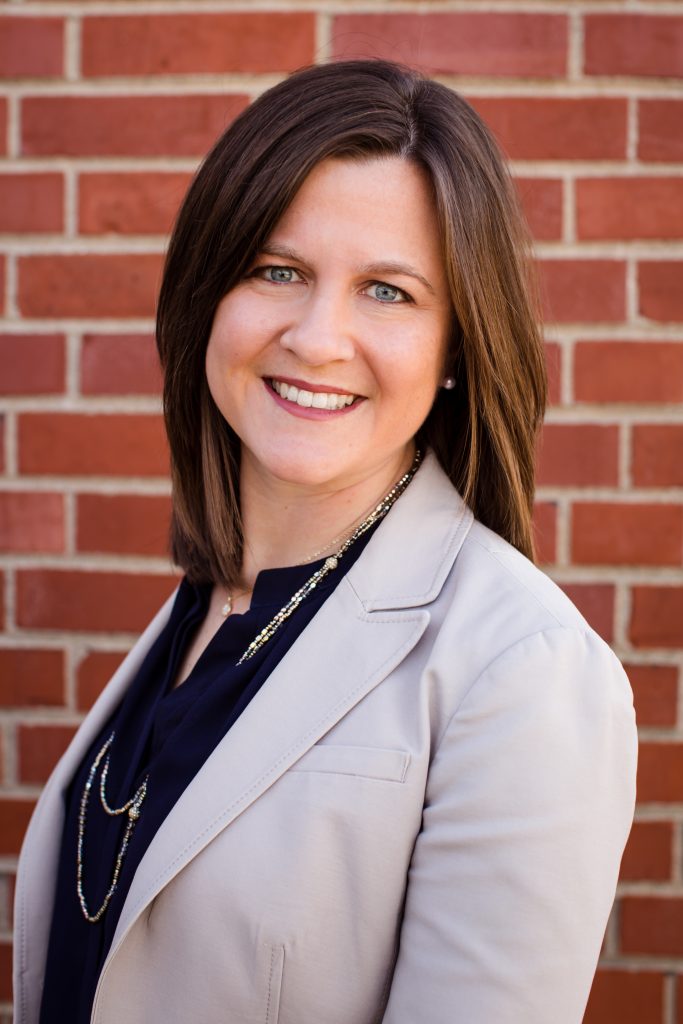
A reflection from World Relief Chicagoland Executive Director Susan Sperry.
June is World Refugee Awareness Month. And on June 20th, we celebrate World Refugee Day. This year, the theme of World Refugee Day is focused on the human right to seek safety.
Whoever they are, people forced to flee should be treated with dignity. Anyone can seek protection, regardless of who they are or what they believe. It is non-negotiable: seeking safety is a human right.
Wherever they come from, people forced to flee should be welcomed. Refugees come from all over the globe. To get out of harm’s way, they might take a plane, a boat, or travel on foot. What remains universal is the right to seek safety.
Whenever people are forced to flee, they have a right to be protected. Whatever the threat – war, violence, persecution – everyone deserves protection. Everyone has a right to be safe.
UNHCR
Who are the people seeking safety?
This is a time of visible conflicts. You might think of Ukraine. There are millions of others who have fled their homes due to less-publicized conflict in places like Ethiopia, Myanmar, or South Sudan. Many of these people become refugees. And during Refugee Awareness Month, it is important that we tell their stories of leaving home to seek refuge.
And yet there are others too – people who arrive in the United States seeking protection from violence because of their identity, religion, or views.
June is National Immigrant Heritage Month, so we also have the time to consider our immigrant neighbors who left beloved homelands, friends, and family…to seek safety and a place to live freely.
This month, I am reflecting on the key reason why both refugees and immigrants must have the right to seek safety: each one is a human being. Those of us who follow Jesus believe in the concept of the “Imago Dei”: that each person is made in the “Image of God.” Let’s explore a few reasons why that makes such an impact on how we treat our immigrant and refugee neighbors.
1. Remembering the Imago Dei Transforms Our Relationships from 2D to 3D
I recently had a conversation with a pastor about what it means to cultivate deep relationships. This pastor framed the conversation as taking a relationship from two dimensions (2D) to three dimensions (3D). By necessity, all of us have “2D” relationships. There are people we know of and we know about, but we don’t know in-depth. We know their outer image, but it’s more of a caricature. We may not think of them as a complex individual with the same level of joy, pain, and experience that we have.
A person becomes “3D” when we spend time together. By talking, laughing, eating, and being human together, we gain insight into their joys, pains, dreams, and fears. When we share life together, we become better able to see the image of God in the person before us and also recognize it within ourselves.
That’s also how we begin to understand each other’s potential. We recognize their capacity to love, create, and build relationships — and that those are qualities we share by virtue of being humans, created in the image of God.
Relationships that move from 2D to 3D begin the process of building community. And in community, where we recognize each other’s humanity, potential, and limitations, we can create safety and space for each other to thrive.
2. Developing Relationships and Belonging Requires Time
In more than 20 years with World Relief, I have seen thousands of people resettled and thousands more immigrants become a part of the World Relief community in Chicagoland. And I have experienced the many ways that being together in community is rewarding and transformative for all involved. In my friendships with immigrants and refugees like Deborah, Jerome, Mohammad, Durmomo, and many others, I have gained an appreciation for the way that the image of God manifests in the creativity, wisdom, and compassion of those around me. Keep an eye out for an upcoming blog series from my friend Durmomo about this!
In each of these friendships, investing time with each other has transformed a 2D image in my head into a 3D understanding in my heart. I am deeply grateful for how these relationships and how we continue to shape each other.
3. Our Value as Humans Gives us the Right to Seek Safety
Christianity, and many other faiths, emphasize the fact that human life is precious. This common thread across cultures is backed up in the theological belief of Christians, that humans created by God and loved by Him, are valuable and important. When someone’s life is threatened, they should have the right to seek safety so that they can experience peace, a relationship with God and others, and the opportunity to use their God-given talents and passions. As Christians, we can protect that opportunity by creating a welcoming space.
I believe that together, we can form a movement to serve the vulnerable people among us. That includes extending safety to refugees and immigrants who have fled war, violence, and persecution and allows us to see the value in every human life. We welcome them. Whoever they are, wherever they come from, and whenever they arrive.
Continue reading:
Ali’s Story: A Refugee Pharmacist Using His Career to Give Back to Others
Finally, I’m Home: Raphael’s Story of 8 Years Waiting for Resettlement
20 Ways to Learn More About Refugees
Over the past year, crises in Afghanistan and Ukraine have reminded us of the devastating impacts of war — especially on those forced to flee their homes.
Around the world, a record breaking 100 million people have been forcibly displaced. Of those, 26.6 million are considered refugees, having fled across an international border due to war, violence, conflict or persecution. That’s millions of mothers and fathers, daughters and sons, teachers, doctors and friends — each created in the image of God — with full lives and identities long before they became refugees.
As we enter World Refugee Awareness Month and look toward World Refugee Day on June 20th, we’ve compiled a list of books, podcasts, videos and more to help answer your questions about refugees. As you engage with and share these resources, we hope you’ll be inspired to join us in creating a world where everyone can thrive.
READ
Blog: Drivers of Mass Displacement
For every 95 persons worldwide, 1 has been displaced. People are displaced from their homes for myriad reasons, including persecution, conflict, violence, human rights violations and climate-related factors. World Relief’s Lydia Dawson explains the drivers of mass displacement and how World Relief is responding globally.
Blog: Welcoming the Welcomers: One Afghan’s Journey to the U.S.
David was one of the 53,000 Afghans evacuated out of Kabul in August. He shares his story of escaping Afghanistan with his family, resettling with World Relief North Texas and the long road to rebuilding.
Book: Inalienable: How Marginalized Kingdom Voices Can Help Save the American Church
U.S. churches are at a critical crossroads — blurred lines between discipleship and partisanship have compromised our witness and confused our national and individual responses to refugees and “the stranger.” In a new book, pastor Eric Costanzo, missiologist Daniel Yang and World Relief’s Matthew Soerens find hope in the witness of global Christians, the poor and the ancient church.
Book: Beyond Welcome: Centering Immigrants in Our Christian Response to Immigration
World Relief’s Karen González, invites Christians passionate about serving immigrants to explore how we can create welcoming communities that put our immigrant neighbors at the center of the conversation. Now available for pre-order.
Book: Everything Sad is Untrue: (a true story)
Following his mother’s vocal embrace of Christianity, Daniel Nayeri, his mother and his sister were forced to flee Iran. In this memoir, he retells the tales of his family’s history from his perspective as a misfit middle schooler in Oklahoma.
Book: The Girl Who Smiled Beads
When Clementine was six years old, she and her 15-year-old sister, Clair, fled the massacre that was happening in their home country of Rwanda. In this riveting memoir, Clementine tells their story of rebuilding and reclaiming life on their own terms.
Book: On the Other Side of the Sky
After stepping on a landmine and narrowly escaping death, Farah Ahmedi fled her home country of Afghanistan with her family and resettled in the U.S. Today, Farah is a writer, mother, speaker, humanitarian and activist. She tells her story in this remarkable memoir.
LISTEN
This World Relief mini-series offers a global and a biblical perspective on the subjects of immigration, mass displacement and refugee resettlement, diving into current policies and practices and sharing stories of our collective human experience.
Podcast: Working a Refugee Crisis: Jordan
In 2011, civil war broke out in Syria resulting in the largest refugee crisis since World War II. In this six-episode series, hear conversations from refugees, locals, relief workers and aid agencies who responded to the crisis in Jordan and gain a deeper understanding of the refugee crisis.
This six-part series traces the U.S. refugee resettlement journey through the eyes of those directly experiencing it. Follow along as each episode brings the listener into the daily lives of refugees adjusting to life in the U.S.
Podcast Episode: Learn and Pray Together for Ukraine with Jenny Yang
Crises like the war in Ukraine can feel overwhelming. In this podcast episode, Jamie Ivey talks with World Relief’s Jenny Yang about practical ways Christians can respond through prayer, advocacy and action.
WATCH
TEDxTalk: One Refugee’s Life Experience | Come Nzibarega
Born and raised in Burundi, Come Nzibarega shares his story of escaping torture and civil war. Today, Come works as an Employment Specialist for World Relief. Hear more of his story and hear why Come thinks refugee camps are the richest places in the world.
After 8 years in a Refugee camp, Raphael arrived in the United States and was welcomed by World Relief volunteers. Now, he works on staff with World Relief in North Carolina. In this short video, he shares his resettlement journey.
Video: Who are Refugees and How Do They Arrive in the United States?
From flight and displacement to arrival and integration, this 7-minute animated video tells the true story of a refugee family’s experience in each stage of the refugee resettlement process.
STUDY
World Relief Workshop Course: Navigating Friendships
Navigating friendships with those who are different from us can be rewarding — and challenging! In this self-paced, online course you’ll learn essential skills for building empowering, long-lasting friendships with those who may differ from you in culture, socioeconomic status and religion, and best practices for supporting a friend who lives with trauma. Now through June 30, enroll for 50% off with code WORLDREFUGEEDAY50.
Our culture is flooded with thoughts and opinions on people who leave their homes and immigrate to the U.S. — but what does the Bible have to say about migration? Journey deeper into God’s redemptive story of migration and discover his heart for refugees, immigrants and the displaced in this free, six-week study from our partners at Women of Welcome.
Bible Reading Plan: The I Was a Stranger Challenge
Take the challenge and discover God’s heart for those who have been displaced. Over the course of 40 days, read one Bible passage a day that speaks to God’s love for foreigners and refugees.
FOR THE WHOLE FAMILY
Women of Welcome Family Toolkit
Do you wish you could talk with your kids or teenagers about immigration but aren’t sure how? This toolkit makes it simple and fun to invite your family to engage in positive conversations on hospitality and immigration through scripture reading, discussion questions, coloring pages, prayer journal pages, book recommendations and more.
For parents and teachers struggling to know how to talk about mass displacement with children and teens, the UN Refugee Agency offers teaching materials on refugees, asylum and migration, as well as guidance for teachers working with refugee children in the classroom.
Want to keep learning? Stay informed about refugee resettlement and World Relief’s work to care for those in vulnerable situations around the world by signing up for our monthly email newsletter.

Karen Spencer is World Relief’s U.S. Marketing Partner and serves U.S. offices in the area of identity and messaging. She previously served as Mobilization Director for World Relief in Memphis. She is a connector of people, places, passions and purpose.

Kelly Hill serves as a Content Writer at World Relief. She previously served as Volunteer Services Manager at World Relief Triad in North Carolina before moving to Salt Lake City. With a background in International and Intercultural Communication, she is passionate about the power of story to connect people of diverse experiences.
A Reflection During Volunteer Appreciation Month
By Rachel Wassink, Volunteer Mobilization Manager at World Relief Chicagoland.
Along with the coming of spring and the celebration of Easter, April is when World Relief celebrates National Volunteer Appreciation week. A week when we recognize the profound impact of volunteers and the lasting change they bring to our communities.
Volunteers have walked alongside refugees and other immigrants through changes and challenges, but they have not lost hope. They know that creating change that lasts isn’t easy, but it’s possible when we move together.
What I’ve Seen
Over the past four years, I have had the joy of working with volunteers serving across Chicagoland in a variety of opportunities like Friendship Partners, Youth Tutors, Transportation Assistants, and more. I have seen volunteers give their time, resources, creativity, and expertise. All while maintaining a posture of humility and curiosity as they learn from our neighbors.
Amidst changes like COVID-19 and the surge of Afghan arrivals this past fall, volunteers have shown unwavering support. Their steadfast presence has been a constant encouragement to me as we move forward together.
One Volunteer’s Impact
There are unending stories I could share of how volunteers have made a lasting change. But there’s one that’s been at the front of my mind lately as I see buds on the trees bursting and daffodils sprouting up through the ground.
A family arrived in the spring of 2020 at the beginning of the pandemic. Soon they were matched virtually with a Friendship Partner volunteer. The family mentioned that one of their goals was to start a garden so they could have fresh food and be reminded of their garden back home. Over video calls and through a language difference, their Friendship Partner helped them make a list of supplies and create a plan for where to set up the garden. Their Friendship Partner collected some garden supplies from their church community and was able to drop off the supplies. Within a few days, they watched the family plant their garden virtually.
Fast forward to spring of 2021, and this Friendship Partner got to join the family outside to plant their garden once again! That simple act of service in supporting the family with their first garden bloomed into a joyful tradition.
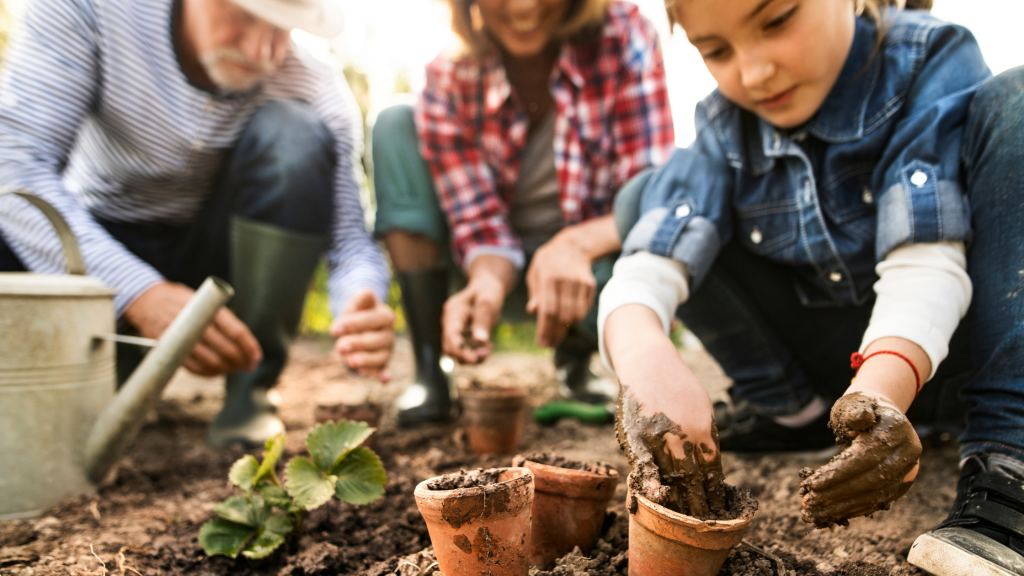
You can make a difference
Volunteers walk alongside refugee and immigrant neighbors in dozens of small and big ways. Creating change that lasts, and we are so thankful for each and every volunteer. From gardening to navigating new systems to sharing a cup of tea, volunteers show up and make a difference.
To our volunteers that have been along for the journey – thank you for your generous service. And to those not yet on the team – you too can be part of this community of volunteers moving forward together in welcoming our neighbors and making change that lasts.
Read more about the impact of volunteers and how ordinary moments create a movement of change in our Year In Review: 2021 Year in Review | World Relief Chicagoland Annual Report
From DRC to the 253: A blacklisted, exiled journalist hasn’t given up working for a better Congo
At his newfound home in Tacoma, Washington, Antoine Roger Bolamba has watched Chris Cuomo criticize Donald Trump on live TV. Seven years ago, working for Radio-Télévision Nationale Congolaise, the national TV station of the Democratic Republic of the Congo, he could not have dreamed of criticizing his president.
“In my home country, you will not finish your program,” he said. “You will see military people; police will come.”
Bolamba narrowly avoided this very fate. Achieving his lifelong dream, he held the spotlight as a primetime anchor for Congo’s national TV station. But when the country’s lack of journalistic freedom became a personal reality, he was confronted by a terrible choice.
A Crisis of Press Freedom
Covering the vast, resource-rich Congo River Basin, Congo is the second largest country in Africa. Several local kingdoms dominated the area before Belgian colonization during the 19th and 20th centuries. Despite gaining independence in 1960, the nation has been plagued by constant internal and external conflicts and subsequent humanitarian crises.
Bolamba was born in Kinshasa, Congo’s capital, and raised by Catholic charismatic parents. When he was still young, Bolamba knew he wanted to become either a priest or a journalist. He wanted to serve God and inform people.
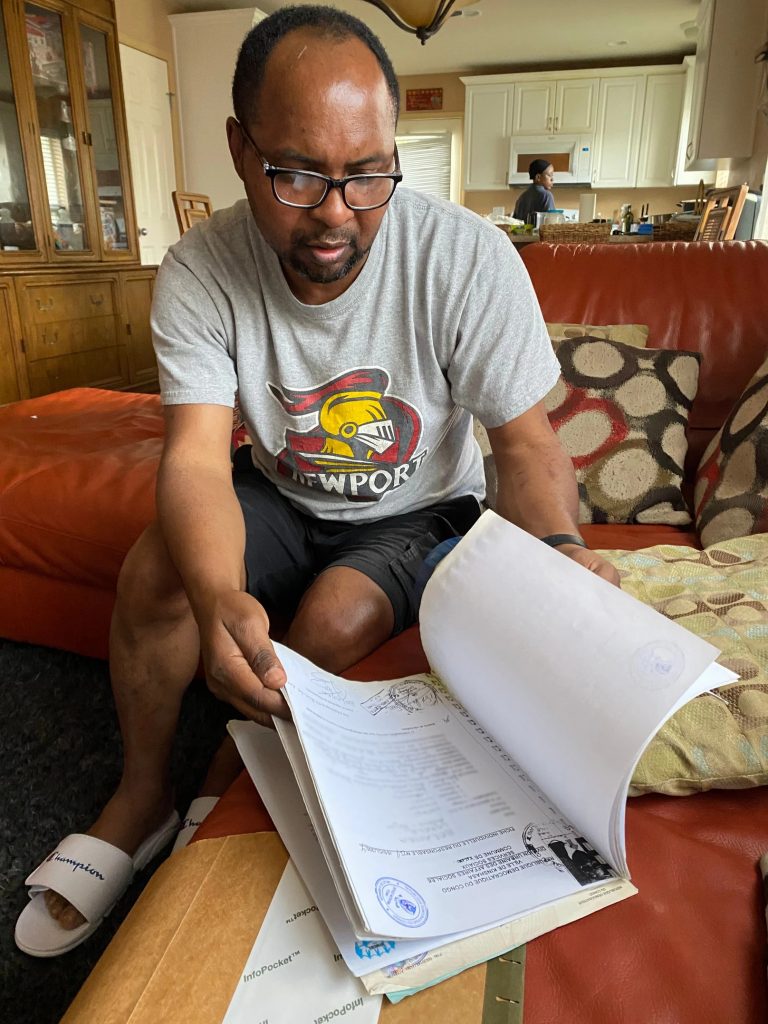
from an educational nonprofit he started in Congo. (Photo/Daniel Hart)
He interned for a private TV broadcaster while studying journalism at the Catholic University of Congo. In 2010, Bolamba started working for the national TV station. Within six months, he was presenting the 8 p.m. news for the country’s largest TV audience.
He didn’t stop there. In 2012, he was hired as a press attaché for the country’s Planning Ministry. His work took him around the world. In 2013, he created a video on investment opportunities in Congo and presented it alongside the Planning Minister at the U.S.-Africa Business Summit in Chicago. In 2014, he traveled to Mexico City to argue to the Extractive Industries Transparency Initiative that Congo’s mining industry was making meaningful progress toward benefiting the country’s citizens. That same year, he covered a summit in Belgium for the international Congolese diaspora.
For all his success, he was very aware that all was not well for journalists in Congo.
Reporters Without Borders, an international nonprofit that advocates for press freedom, ranked Congo 149 out of 180 in its 2021 World Press Freedom Index. Also this year, Freedom House, a U.S. government-funded research institute, gave Congo a 20 out of 100 ‘not free’ score for political rights and civil liberties.
Bolamba described journalism in Congo as neither free nor independent. Known locally as coupage, payment from sources is an everyday occurrence and practically journalists’ only form of income.
“You are depending on the politician or on people who need you to pass their message,” Bolamba said. “So because you get paid from there, you cannot be objective.”
In addition to the lack of financial independence, Bolamba said he and other journalists were watched closely by government officials as they presented the news, especially when they spoke about the government. He knows many colleagues who have been imprisoned as a result of their work. Others have died under mysterious circumstances. Bolamba learned to be careful what he ate or drank, especially with politicians. In taxis, he always sat beside the door, not between other passengers. He took care to protect his reputation from defamation, avoiding the appearance of anything that might be professionally unacceptable.
In 2012, the country’s information minister accused another politician of having sex with a minor, and Bolamba investigated. Although the politician was jailed, Bolamba’s coverage cast the allegations into doubt. He doesn’t know for sure, but he suspects that his work on this story may have led to what came next.
The Crash
One day in 2013, the TV station’s human resources director quietly showed Bolamba a letter that the director of the station had sent to several government officials. The HR director wouldn’t give Bolamba a copy, fearing for his own safety. The letter stated that Bolamba was working against the ligne editorial, the editorial policy the government expected to hear on national TV. It claimed that Bolamba was giving too much airtime to the opposition. The HR director warned that Bolamba’s director was trying to destroy his reputation and that he was in danger of being imprisoned or killed.
As Bolamba read the letter, he was shocked and bewildered. By the time he left the office, he knew he could not stay in Congo.
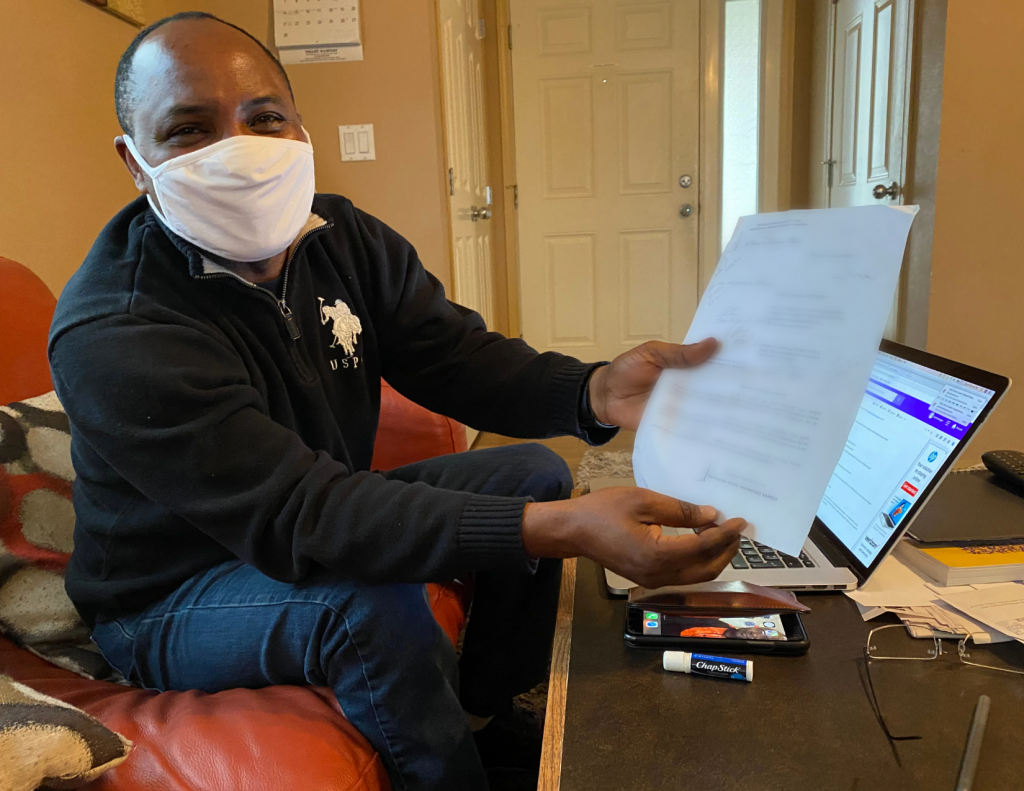
Eventually, an auditor who Bolamba knew was able to surreptitiously secure a copy of the letter for him. He asked friends and colleagues for help and advice. Over and over, they told him the same thing: your life is in danger; you have to leave. Fortunately, Bolamba had a U.S. visa from his previous work trips. However, his sons and Claudia, his wife, did not. She implored him not to leave.
“‘It looks like something bad is coming, so I need to leave,’” Bolamba recalled telling her. “She insists, ‘Don’t do that! I have kids.’”
As Bolamba remembered agonizing over the possibility of leaving his wife and four sons behind, he stopped, unable to continue for several minutes. He silently wiped away tears triggered by the memory of that separation.
Slowly, in a low, constricted voice, he began his story again, recounting how Claudia left with the children for another part of the country, far from Kinshasa.
“In normal time, I could not accept that my spouse and kids live there,” he said. “No water, no electricity. So no car. No good school.” He said the decision still haunts him.
On March 1, 2015, compelled by the real possibility of arrest or murder, Bolamba left the country.
“I arrived here in Seattle with nothing,” he said. “So I restarted a new life from the crash.”
He stayed with various friends for weeks or months at a time. He sent documentation of his experience, including the letter that had blacklisted him, to U.S. Citizenship and Immigration Services. They sent him a work authorization card to use while his case was considered. Over the next few years, Bolamba took jobs as a security guard, a recycling sorter and a Lyft driver.
In 2018, he received the news he had been hoping for: he had been granted asylum. He received his Green Card, confirming his status as a permanent U.S. resident. Then, he went to World Relief, looking for help to bring his family from Congo. World Relief’s Immigration Legal Services team provided a cheaper option for help with submitting the needed forms. That year, Bolamba’s wife and sons were able to join him in Seattle. Bolamba thanked God for reunifying his family.
At the same time, Bolamba said he continues to grieve what he lost. Since arriving, he has worked to survive, not to pursue journalism. He wonders if he will never do his dream job again.
“I was thinking about that today again,” he said. “If I didn’t take that decision to be proactive, I don’t know what should happen. I don’t know. But I took this action. Today I can live with my spouse and my kids – far away from my business, my job, my family, my friends.”
Start Somewhere
In spite of his exile, Bolamba remains committed to the journalistic ideal. While he currently works as a caregiver, he is eager to return to reporting. In March, he received certification as a public relations consultant and completed online courses in human rights and diplomatic protocol. He is a member of the Seattle Association of Black Journalists.
Looking to the future, he is working to build a public relations channel called Pano 5 as well as a geopolitical podcast focused on Congolese politics, poverty and natural resources. He has plans for a nonprofit, African School of Family Wellbeing, that would work to improve life for Congolese families.
“I don’t like to count on people anymore,” he said. “I prefer to count on God and listen to myself, what God is telling me to do, go where God is telling me to go.”
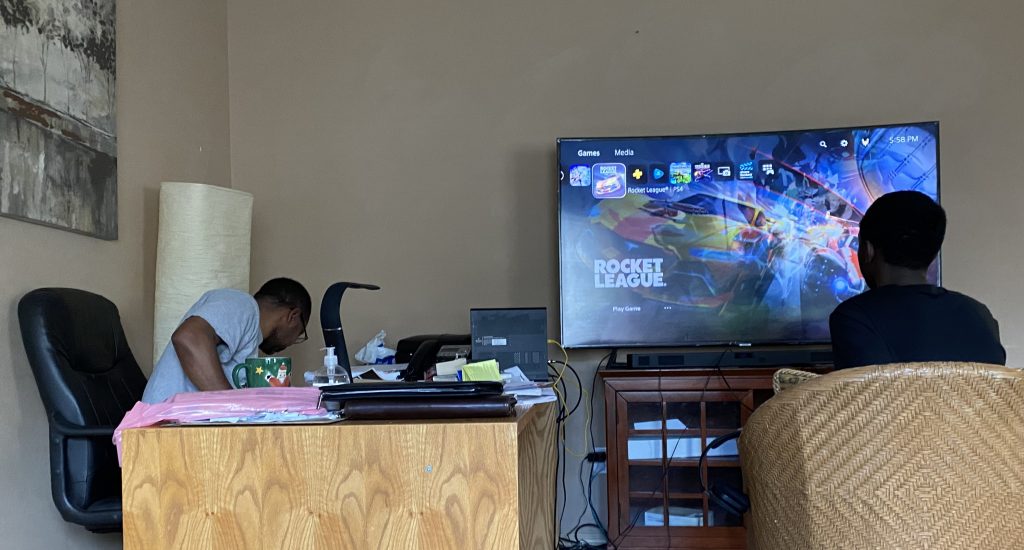
He said his accent and lack of vocabulary pose significant challenges.
“I need to start somewhere because it’s kind of a passion for me. But a passion that broke,” he said.
The threat of violence, a harrowing separation from his family and the struggle to rebuild a life far from home shattered Bolamba’s dream. Yet here on the other side of the world, he is reassembling his vision piece by piece. Bolamba is doing all he can to break the pattern of violence and political repression that has plagued his homeland for decades. He said he hopes to see a president legitimately elected through the democratic process.
“My hope is that one day, the Congo will be living in peace, everywhere in the country,” he said.
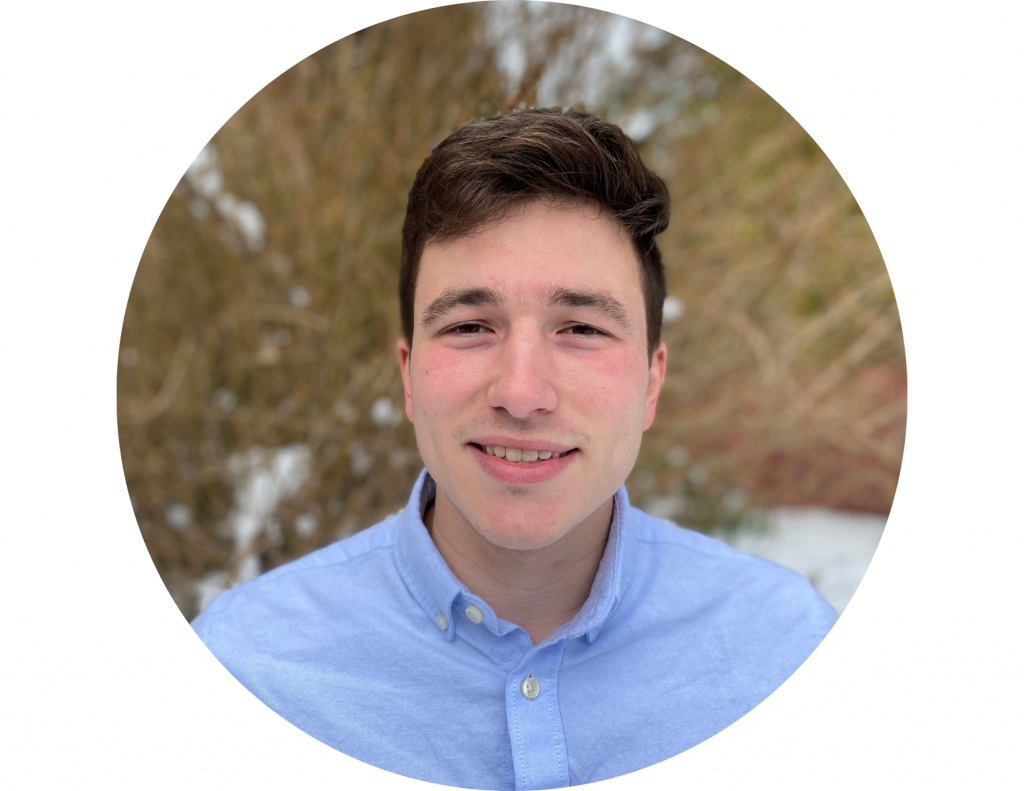
Daniel Hart is a Seattle-based journalist who writes about politics, immigration, and religion. In 2020, he completed a refugee resettlement internship with World Relief Seattle.
Community Partner Highlight: How a High-Schooler Mobilized Her Church to Donate 1,600 Pounds of Food
When assigned a year-long research project for her senior year of high school, Kamree Anderson knew exactly what topic to choose. What she didn’t know is that she would use this project to inspire long-term change.
Where It All Began
Senior Kamree knew for the subject of her final, ~15-page paper, she would have to choose a subject that was relevant to her community and involved her passions. “I’m super passionate about dietetics, nutrition, and generally how food works within the body,” Kamree says. “I knew the topic had to be on an issue in the community, though. I’d need to find a population in the area that this topic applies to.” With some further preliminary research, Kamree came to learn that the crisis level of malnutrition in refugees internationally stays high. She began to reach out to organizations locally that worked with refugees at that point.
The challenge lay in finding other organizations that are able to take food donations. It was her mom, Starr Anderson, who had recently worked with World Relief Triad, that suggested they call to find out if organizing a food drive to donate to the office would be possible. “I had contacted World Relief in the fall to find out what needs we could assist with,” Starr says. “ I put together a group of families from our congregation that could help with organizing the warehouse one Saturday in January of this year. At the same time, Kamree was working on her senior project.”
Kamree knew that the items would need to be specific in order to meet the needs of different diets based on culture, nationality, and religion, so after receiving a list from the office, she got to work.
Engaging the Community
From there, it was up to the high schooler to create excitement, involvement, and engagement. She decided to mobilize the congregation of her church, The Church of Jesus Christ of Latter Day Saints, in a church-wide food drive. She specifically chose to focus on her peers in her youth group.
“As part of the drive at my church, I made it a competition between different ages in the group to create excitement,” Kamree says. “Whoever brought the most food got to pie some of their friends in the face.” Her parents laugh at the “prize” for this project. They’re also quick to point out the impact of the illustration that their daughter used to also educate her peers through. This activity served as a way to visually represent the privilege that the U.S. possesses.
“I think in the U.S., we don’t always realize how blessed we are with resources,” Kamree says. By taping off certain-sized squares on the ground of where her youth group gathers, she showed the vast difference of square footage per household in other countries. “I was inspired to do the activity by a former teacher in middle school who did something similar. I remembered how much it impacted me.” After dividing the students up into each square based on room per capita, she also gave out a certain amount of cookies to each country to represent the amount of food that each country receives to really demonstrate the crisis.
When asked what was the largest takeaway from the process, Kamree speaks on the impact of being able to share her research with peers as a point of interest. “Personally, I knew a lot about dietetics before. But going through this project and specifically researching how it affects refugees and explaining it to my peers sparked a lot of interest in me,” she says.
“I want to keep helping people learn about it. Now, I also want to work in a refugee crisis center or something similar when I’m older.”
Setting an Example Across Generations
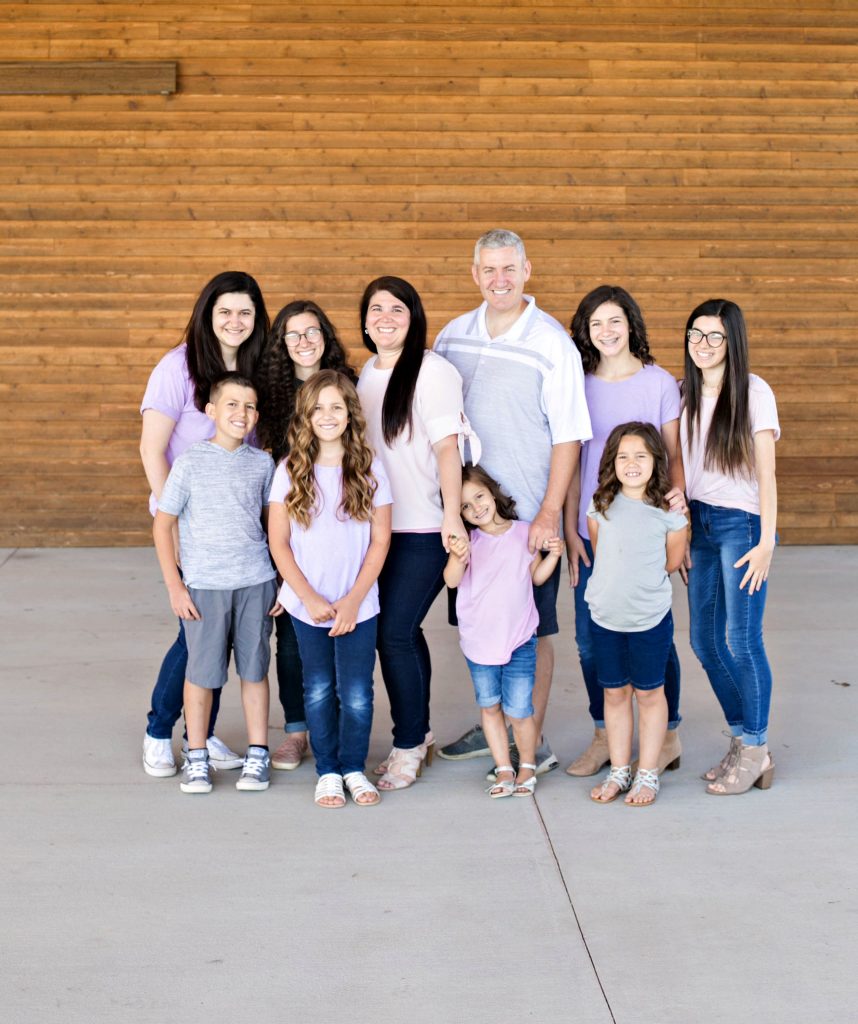
Her parents are still amazed by her leadership. “She ran this through our entire congregation and even into our neighborhood,” her mom says. “We’ve received continual comments about how amazing it is that Kamree is the one spearheading this effort. We’re grateful that she got the opportunity to do this.” Her father, Robb, is excited by the potential that he thinks younger people show. “We can’t underestimate them and what they can do,” he says.
Their church congregation is already asking if this is going to be an ongoing yearly effort. Kamree encourages them and the rest of her community, including her younger siblings who wanted to help, to remember that every little bit counts. When reflecting upon the response of her church, she states that “that’s how it’s supposed to be.” She knows that when we come together and ask partnering agencies and nonprofits what we can do instead of waiting, real change can occur.
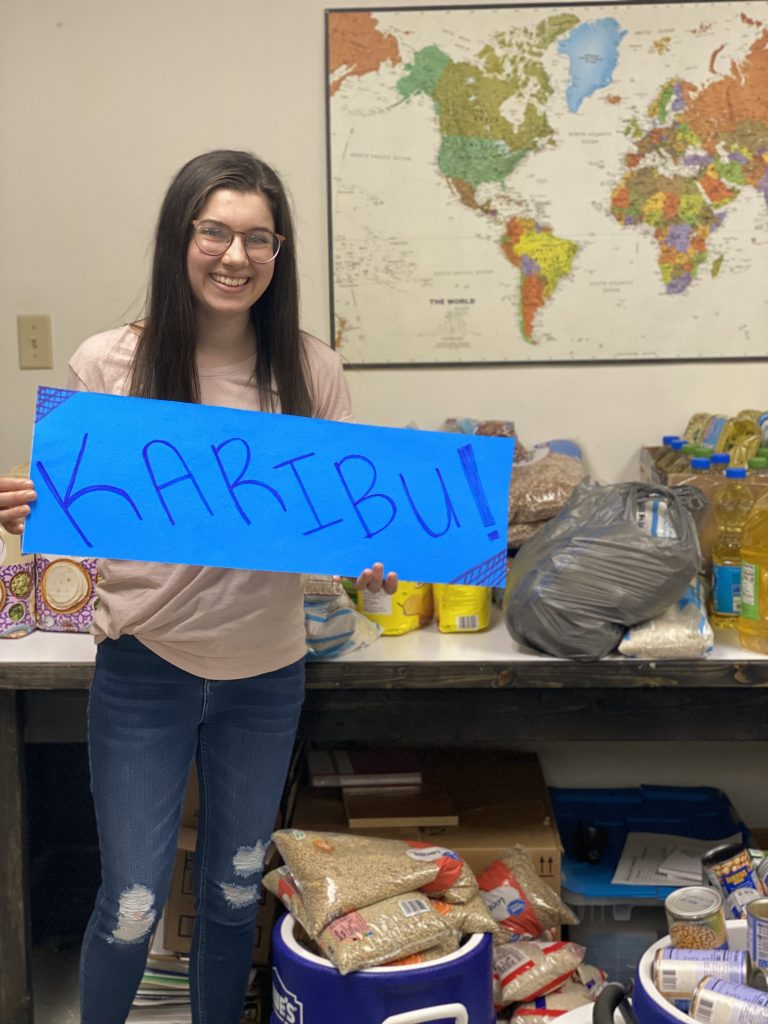
The Gift of Friendship – Welcome Club for Refugee Students
The little moments that create welcoming communities can make the largest impact in the life of a refugee child.
As part of World Relief Sacramento’s Children and Youth Department highlight, we attended Welcome Club, a weekly afterschool program that focuses on character development and cultural engagement. Students learned about the gift of friendship and love by using rocks, pink and red paint, and multicolored markers to create “friendship rocks” to give to another friend or family member along with a note of encouragement.
Some students decided to give their friendship rocks to World Relief Sacramento team members because of their love for the program –
“Thank you so much for being a great teacher to all of these students. Thank you for everything. Happy Valentines Day.”
“To all of the coaches. Thank you so much for creating Welcome Club. Thank you so much. Happy Valentines Day.”
Programs like Welcome Club change lives by providing a space for refugee students to grow and to feel like kids. It creates a safe environment for youth to feel belonging.
We wouldn’t be able to make lasting impacts without your continuous support. You can help programs like Welcome Club this month by participating in our Children and Youth drive this month! Help us reach our goal of giving 250 $15 Target gift cards to teach students financial independence and to encourage accomplishing goals.
Click here to donate and send to Meghan Scurti (4616 Roseville Rd, Ste 107 North Highlands, CA) or by dropping them off at our office during our donation hours (Fridays 11am-3pm).
Want to continually make a lasting impact? You can become a monthly donor by clicking here!
Join us in making a difference in the lives of refugee youth.










